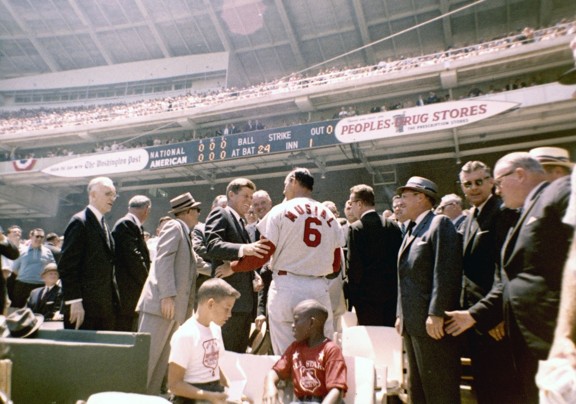|
Ken Griffey was between seasons on Nov. 21, 1969. He had just hit .281 for the Reds’ Gulf League team – his first year in pro ball -- and was waiting to play in Sioux Falls in 1970. He did what made economic sense for a young man and his pregnant wife – they went home, which in this case was Donora, Pa.
Three generations have come through that hard town of zinc plants on the Monongahela River. Ken’s father, Buddy, was a great three-sport athlete at Donora High, whose teammate in basketball and baseball was a skinny kid named Stan Musial. Years later, Musial would softly let it be known he had no problem playing with or against African-Americans because he had grown up with them as teammates. Ken Griffey was also a three-sport athlete. Baseball was his weakest sport, but he signed with the Reds, and they taught him to hit. His first-born, Ken, Jr., happened to arrive on Stan Musial’s 49th birthday. They love that bond, the old Cardinal and the retired Mariner. Somewhere I have a gorgeous color photo of Musial in a gaudy sport shirt and Junior in a Mariner uniform, both smiling. It was taken by Dick Collins, who photographed generations of Hall of Fame celebrations. If I ever get the photo scanned, I’ll put it up here. Meantime, Junior and Musial are linked forever, albeit with a melancholy date. Stan the Man referred to John F. Kennedy as “my buddy.” They met one day in September of 1959 in Milwaukee when the campaigning senator from Massachusetts spotted the Cardinal bus, and sought out Musial, asking if he would campaign for him. In October of 1960, Musial went on the road for a week in what are now called Red States. He had a rollicking good time travelling with James A. Michener, Byron (Whizzer) White, Arthur M. Schlesinger, Jr., Jeff Chandler, Ethel Kennedy and Joan Kennedy. In the 2011 biography, Stan Musial: An American Life, another of the campaigners, Angie Dickinson, raves about the athlete who made everybody laugh. Musial always said he lost all nine states for the President, but it was more like 2-7. Musial and JFK met again at the White House before the 1962 All-Star Game. The President noted that people thought he was too young and Musial too old to ply their respective trades. They laughed about that, two guys who knew they had it pretty good. On Nov. 22, 1963, a lot of people did not feel like putting one foot after another, but Musial showed up at his restaurant and asked customers if everything was all right with their dinners. One customer who was there that night said he thought Musial showed up because people needed to see his familiar face. Truth or imagination, it was a nice thought. All of us of a certain age remember where we were that day. * * *. The St. Louis Post-Dispatch has a nice Thanksgiving feature on Stan the Man:: http://www.stltoday.com/gallery/sports/baseball/professional/reasons-why-stan-is-the-man/collection_052e6c5c-2516-56b5-b71d-4ae37a07c6e1.html#0 THIS JUST IN: DAVID VECSEY WROTE A SWEET MEMORY OF THE SUMMER WHEN HE AND JUNIOR WERE BOTH BEING PRODUCTIVE IN SEATTLE. http://idaveblog.weebly.com/1/post/2012/11/happy-birthday-ken-griffey-jr.html
Brian Savin
11/23/2012 02:55:15 am
Geometry class. Really cute, tall young teacher with short, very curly dark blond hair whose natural expression was a smile -- permanent, probably even in her sleep. She was called out of the room, and when she came back she announced with wide blue eyes that the President had been shot. "So why are you smiling?" shouted out a not too good student. For the only time in my life I saw saw her smile disappear. It took effort. My first feeling was being very sorry.....for her.
George Vecsey
11/23/2012 10:09:52 am
We were playing the Kennedy sport -- touch football -- in, of all names, Kennedy Park in Hempstead, Long Island. Bunch of Newsday guys and a couple of Mets in their off-season. Anita, Jake's fiancee, came running from the parking lot, saying,"They shot the President. The stock market is closed." We stopped playing.
Brian Savin
11/24/2012 12:57:01 am
Never heard anything like that one before. School day/ work day. The original "casual Friday" was for newsies?
Brian Savin
11/27/2012 12:31:57 pm
Interesting Times stuff on Miller today. All new to me. Does anyone have an assessment of his contribution to the game?
Ed Martin
11/23/2012 01:12:24 pm
We were living in Tuscaloosa, Alabama and I was teaching at the University of Alabama where I was Co-director of the Speech and Hearing Clinic. Several colleagues were having lunch and we returned immediately. Peggy was taking classes and we got together and went home. I did not want to hear anyone, saying "good."
George Vecsey
11/24/2012 03:29:37 am
Ed: There were so many hateful vibrations before that trip. When our friend said "they," I think many of us thought we knew what she meant. GV
Frank Barning
11/27/2012 06:20:17 am
I was a senior at Hofstra, George's alma mater. Representing the Hofstra Chronicle at a journalism convention at Southern Illinois University, I had just entered my hotel room and sitting on the bed watching TV was a maid who was in tears. "They shot the president."
Verenda Smith
11/29/2012 04:15:14 am
The St. Louis Hall of Fame Museum has this as its lead item:
George Vecsey
11/29/2012 10:35:04 am
Verenda, That hall was being reconstructed while I was working on the book., Glad to hear it is up and running, and that Stan the Man has a prominent place. Regards. 10/27/2016 04:09:55 pm
Very nice information my friend i liked this is amazing and perfect ideas good job. Comments are closed.
|
Categories
All
|










